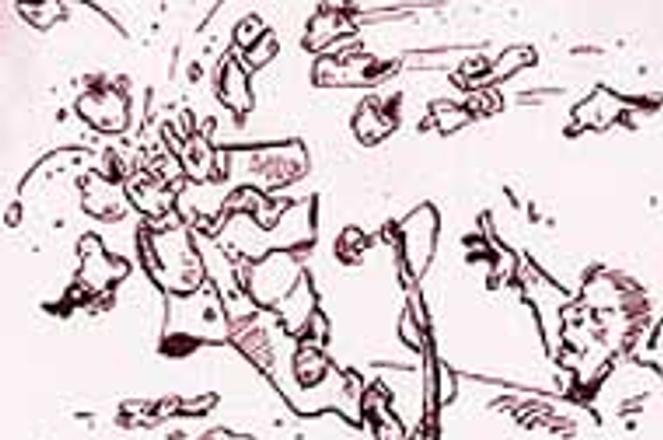The crowds which turned out to bawl criticisms of the government's economic policy were in no mood to hear Schmögnerová's "truth."author: Igor Lyskov
So Slovakia's unions finally found their voice, showing up 40,000 strong in the late September sunshine to bawl criticisms at the current government's handling of the economy. But where were these brave souls two or three years ago, when the Mečiar government plunged the Slovak economy into debt, sabotaged the NATO referendum, gutted the nation's culture programmes and spoiled the country's EU chances?
Finance Minister Brigita Schmögnerová, the only government minister brave (or foolish) enough to attempt to speak at the rally, was refused access to the microphone by union security guards. She had come, she said later, "to tell people the truth," and to "hold up a mirror and ask the unions" where they had been during the Mečiar era, when other citizens were massing on frozen squares to fight for the nation's fragile democracy.
If the unions aren't prepared to let Schmögnerová and the government explain to people why they are worse off now than before, then they have to start doing the job themselves.
Few of Slovakia's working poor understand why the country is unable to afford them a better living, and they left the Saturday rally unenlightened. Nor do most people yet realise why the country must build a stable democracy before it can hope to have a propsperous economy.
Slovak trade union boss Ivan Saktor, who led the recent Bratislava demonstration with fist raised, is tasting real power for the first time since winning his post in 1997. Real wages are slipping, unemployment is soaring and the cabinet's most recent package of austerity measures has made it a target of accumulated public angst. Nothing could be easier, or more tempting, than to don a red shirt, raise an angry fist and shout defiance against the government.
With Saktor's power, of course, comes the responsibility of making sure that people understand why their lives are getting tougher. But if one looks at the list of 20 demands the unions have submitted to the government, one gets the strong impression that labour leaders themselves have only a dim grasp of economics, and little concern with making their thinking intelligible either to the public or the government.
The premise of the Bratislava demonstration was that the government had refused the unions' demands, and was plunging ahead with economic reform without due regard for how people were being affected.
This is hardly true - fully 16 of the 20 demands have been accepted, and the rest put off until labour leaders explain what they're after. Labour's demand that university graduates be guaranteed their first jobs, for instance, is rather hard to fulfill in a market economy. Nor is the government likely to succeed in forcing private companies to raise wages, or to hire people they don't need so unemployment decreases.
In a recent interview in the weekly paper Domino Fórum, Saktor was asked to explain exactly what he thought the government should do to fulfill the union's vision. "Do I have to give you a lecture on national employment programmes?" he asked. Pushed for an answer, he responded "what, are you trying to test me?"
In most countries, Saktor's behaviour would be perfectly normal; the natural role of labour is to fight corporations for the ears of cabinet ministers, not to explain government policy to union members.
But in Slovakia's perverted political environment, both unions and corporations have to temper their demands with caution. After all, what is the alternative to the current government and its economic austerity? Another four years of Mečiar, of looted public coffers and irresponsible fiscal policy? Renewed international isolation?
Civic unrest can be a destructive social force, and should not be provoked unless people have access to a full picture of their situation. Ivan Saktor and his colleagues appeared to enjoy themselves immensely in front of their supporters, vowing to "fight [the government] until the end," but seemed oblivious of the need to channel people's discontent towards a productive goal - weighing the truth of the government's arguments rather than stopping their ears and screaming for change.
What leadership Saktor fails to deliver, other people will attempt to provide. Many of the demonstrators were vocal supporters of the parties of the political opposition, particularly the HZDS.
Although Saktor claimed the rally was an apolitical, professional affair, the demonstration did come shortly after Mečiar's call for civil unrest and the opposition's prediction of pre-term elections. In attendance were several members of the former Mečiar government - Ján Ľupták, leader of the Workers' Party (ZRS) and former Environment Minister Jozef Zlocha.
"Provocateurs are going to come [to such rallies]," Saktor said afterwards, "you can't stop them."
What Saktor can do is to abandon populism for leadership, exchange slogans for truth, and to submit realistic demands rather than pipe dreams to the government.
If he continues to fan unrest, however, he may unwittingly release the genie from the bottle, removing a government from power before the painful reforms have borne fruit.


